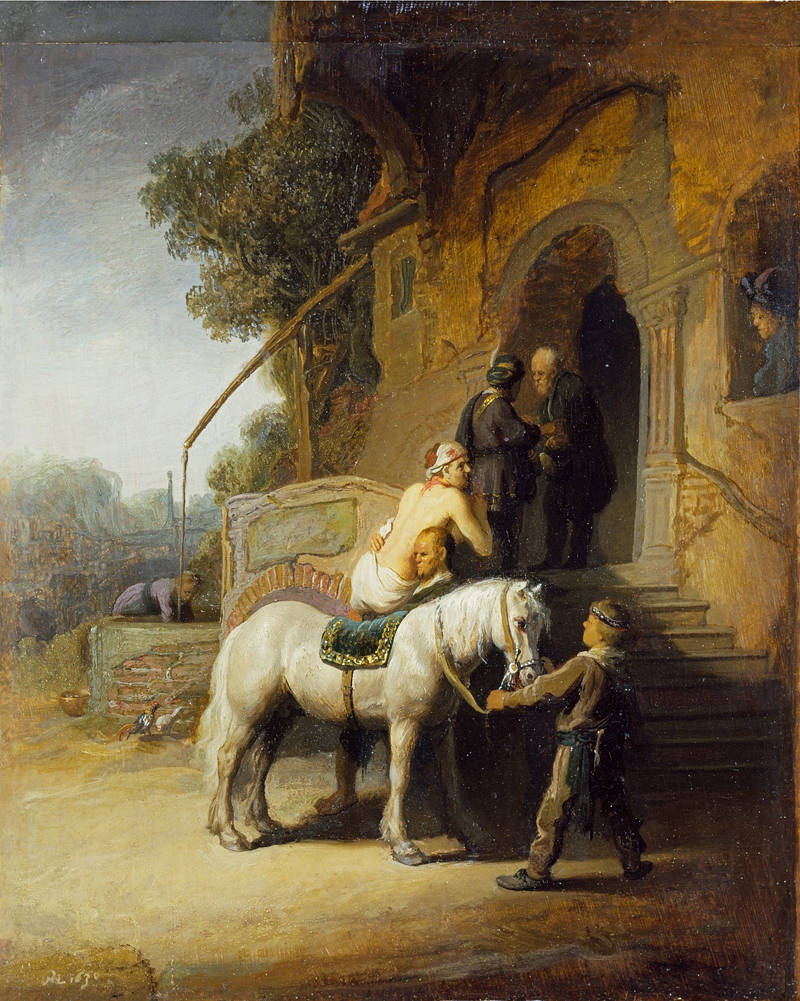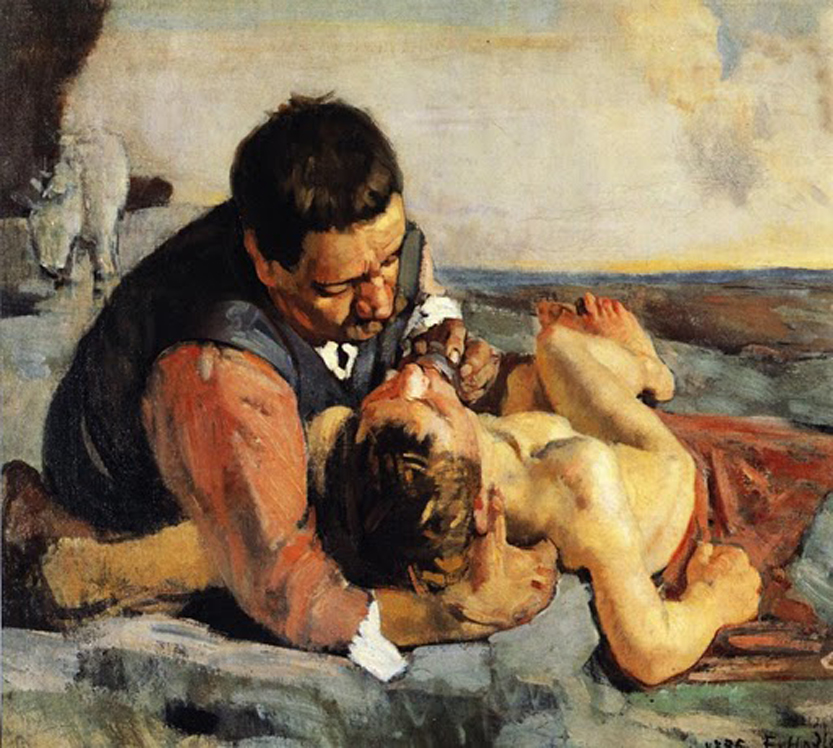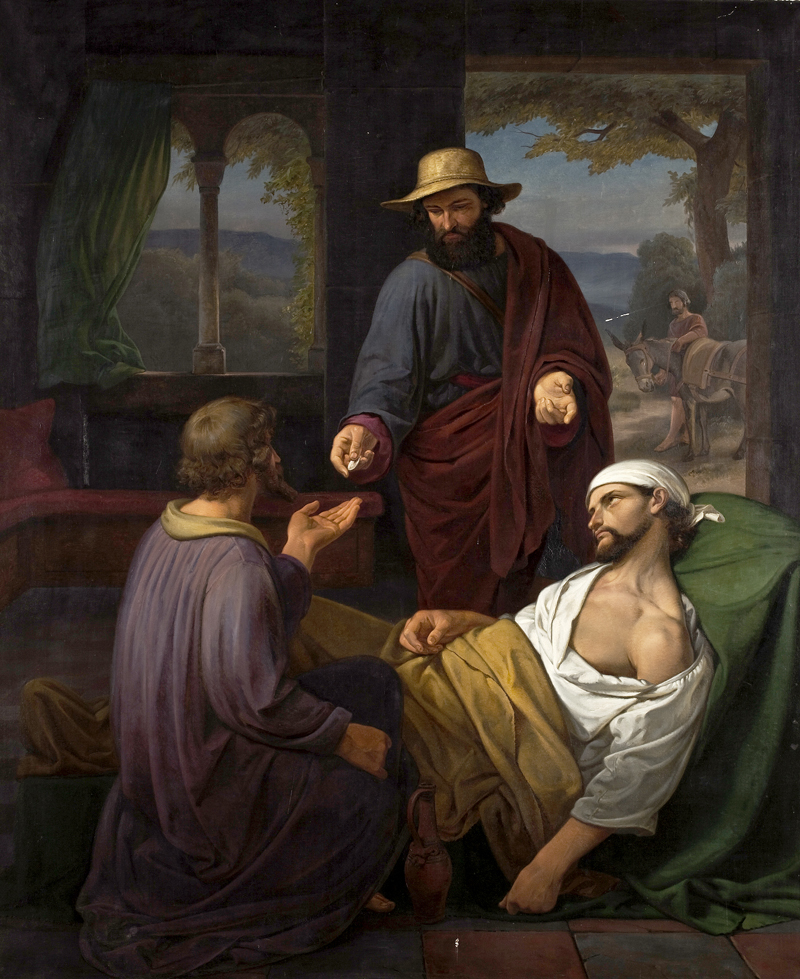
St. Luke 10:25-37; Amos 7:7-17; Psalm 82; Colossians 1:1-14
Barekmor,
Glory be to the Father, to the Son, and to the Holy Spirit,
For this Proper our lectionary gives us the theme of Following the Way of the Lord. We see in our Saviour’s response to this scholar what that way is. It is to love God and all of mankind. All the teaching of Scripture is based on these two tenets.
His answer also exposes those who seem to be experts of the law but disregard the spirit of the law. We know and can be confident that this is the intent of the law because both the Father and the Son proclaim first at the beginning in the law, and now in the incarnation. Anyone that does not accept that love is the basis of the law is ignorant of it from its very first chapter. We must therefore follow the way of the Lord by loving God and humanity.
We will take a look at the overarching picture of this parable and then specifically how it applies to us and how we can live it.
Jericho is a picture of the world. Our Father Adam was cast out from Paradise, from the Heavenly Jerusalem and he now descends to Jericho. However, along the way he is confronted and beaten by robbers. These robbers are the hostile powers, the angels of darkness that have wrapped themselves in light. Adam in his rebellion had removed the protection of the Lord from his life. As we spoke a few weeks ago if we open ourselves to the attack of the enemy we will. It is in choosing disobedience that we open ourselves to the evil one and more temptation.
Three travellers come across this unfortunate man – the human race. A priest, a Levite and a Samaritan. The priest is the law and the Levite is the prophets both stood at a distance and could do nothing to relieve the sufferings of the man. They could only pass by and take note of his situation.

But the third man a Samaritan, He is a picture of Christ. He came down from Jerusalem as Christ descended from heaven. Christ had the power to be neighbour to the whole human race, and he joined our humanity to His nature and treated and healed our wounds in the filth of the road, in the filth of sin. The wounds are our disobedience. The donkey is the Lord’s body – his incarnation that bears us to the Inn i.e. to the Church.
Stepping back a minute, how does he do this healing? St. Ambrose explains,
That Physician has many remedies with which he is accustomed to cure. His speech is remedy. One of his sayings binds up wounds, another treats with oil, another pours in oil. He binds wounds with a stricter rule. He treats with forgiveness of sins. He stings with the rebuke of judgement as if with wine.1
Christ heals and bandages through his words and his forgiveness. It is only through the Gospel and forgiveness that humanity can be restored, and our Saviour has dared to come to earth, taken our nature to bring us this restoration. His work of healing enables the establishment of the Church.
Our salvation has been made possible by Christ and we ought to praise Him and thank Him for His grace and mercy. However, this passage as well as Christ’s life has left us an example to follow.
First the premise of the story – the commands to love. In the first command we are given three ways to love – heart, being and strength. These three correlate to and are the key to overcoming the threefold temptation of the world i.e. possessions, glory, and pleasure. These three are the same basic temptations that our Lord was confronted with.
We shall love our neighbour as ourselves. This brings us to the great and resounding question of the passage, “Who is my neighbour?” The Fathers tell us that everyone is our neighbour and indeed all people are our brothers, sisters, and relatives. St. Jerome tells us that we should not harm anyone and that it is not allowed to do evil to strangers. If we believe we can do any man evil, he refutes this by concluding,
God forbid such a belief! We are neighbours, all people to all people, for we have one Father.2
Verse five in our Psalm reading states,
They [the gods] know not, neither will they understand; they walk on in darkness: all the foundations of the earth are out of course.
Who are the gods? Verse six tells us that they are the children of God. The fathers explain that this is referring to all believers, we who have become children of God through the power of the Holy Spirit. As we read also in the first chapter of St. John’s Gospel,
But to those who did accept him he gave power to become children of God, to those who believe in his name, who were born not by natural generation nor by human choice nor by a man’s decision but of God.
We realise, however, that we are not gods by nature but by the gift of grace that God has bestowed. This is the very reason that the Word was made human, so that we in receiving Him and His adoption should be made God’s children. St. Cyril of Jerusalem warns us not to take this honour lightly.
Being but a wretched person, you are a recipient of a divine title. For listen to Paul, “God is faithful,” or to another text in Scripture, “God is faithful and just.” It was as foreseeing that a divine title would come to be applied to human beings that the psalmist, speaking in the person of God said, “I have said you are gods and all children of the most High.” But see that when the title is faithful, the purpose is not faithless. You have entered the contest; run your course steadfastly. No other chance like this will come your way.3
We are gods, the children of God by grace, therefore we are to imitate Christ as the Samaritan and show mercy to all people. Returning to Psalm 82:5, if we refuse to follow Christ in this matter and instead choose to hate our brother, to hate our neighbour, we will fall away from that which is properly called knowledge. We will walk in darkness, i.e. we will walk in a way that we show that we are guilty, and we will become ignorant of divine matters. We will hold our title as children of God as nothing, and we will count lightly the honour that God has bestowed upon us.
St. Ignatius of Antioch warns us,
No one making a profession of faith ought to sin, nor one possessed of love to hate his brother.4

We have now been brought to the inn. Our wounds have been tended to. Our bodies have been clothed. We are being cured in the Church. What is our responsibility now? We take the role of the innkeeper, tending those who our Lord continues to bring in. As Metropolitan has reminded us, Jesus goes out to rescue the lost sheep. He has compassion on all and doesn’t just say well they learned their lesson.
We use the money, the gifts that He has given us by His Holy Spirit, to tend to their wounds and injuries. If what He left us is lacking for their care, He will provide more. St. Gregory the Great explains what our care is to look like.
Or in the wine he applies the sharpness of constraint, in the oil softness of mercy. By wine let the corrupt parts be washed, by oil let the healing parts be assuaged; we must then mix gentleness with severity, and we must combine the two, that those who are put under us be neither exasperated by our excessive harshness, nor relaxed too much by too much kindness.5
Gentleness and severity must be coupled together. We must have a balance where we are neither overly harsh nor just let anything go. Seeing the example of Christ’s mercy and compassion, we understand what it means to be neighbour to another and we are left with the scholar to heed or disregard his command to, “Go and do likewise.” What will we choose?
In our Epistle reading, St. Paul speaks of the good things to come. He knows that while we are in the midst of this life we are in the midst of temptation and he is giving us hope. Just as in the story of the Good Samaritan, the man was assaulted and beaten by the forces of evil and temptation, but there is hope because Christ rescued him just as he rescues us and promises us the good things that are to come.
We already can see heaven waiting for us as we endure through all the assaults of the evil one in this life. Furthermore, the gospel that has come to us is spreading and growing throughout the whole world and is bearing fruit. The Fathers tell us that the growth speaks of the number of believers increasing. As we have heard recently that over the last three years the work has grown by a third. The fruit speaks of those who hear the gospel and whose lives change to the praise of the glory of our Lord.
The Gospel has not yet reached everyone, but we can see by faith that it will encompass the whole world. We are privileged to be a small part of this as we labour here in the office and at our homes.
St. Paul teaches us that this is the will of God that by walking in good works, words and desires, we should be filled with God’s will who puts His spirit in our hearts. This is the difference between us and those who passed by. They had knowledge, yes, but they differed in that they had no works coupled with their knowledge. Let us not fall into the same trap. Faith must always be coupled with conduct.
Let us purpose to love the Lord our God with our whole being, strength and mind and in this way defeat the three main temptations of the Evil One. We ought to love our neighbour through showing compassion, admonishing when needed, and yet being merciful enough not to drive him away. We must also make sure that we make no distinction based on ethnicity or culture for we are all created by God.
Finally, Let us not despise the honour of being made children of God, but purpose to imitate our Saviour in all things. We must be diligent to look after those He has rescued and brought into the Church. If we seem to be lacking in our ability, let us ask Him to supply that which is lacking according to His grace. We are to rejoice that he has defeated the robbers and transferred from the power darkness to His kingdom and let us live a life full of faith coupled with good works.
In the name of the Father, of the Son, and of the Holy Spirit
Amen
~ Fr. Matthew
1 Thomas C. Oden and Arthur A. Just Jr., Ancient Christian Commentary on Scripture New Testament III (Downers Grove, IL: InterVarsity Press, 2003), 180
2 Ibid., 179
3 Thomas C. Oden and Quentin F. Wesselschmidt, Ancient Christian Commentary on Scripture Old Testament VIII (Downers Grove, IL: InterVarsity Press, 2007), 146
4 https://catenabible.com/bible/lk/10/27
5 https://catenabible.com/bible/lk/10/29
Rembrandt Harmenszoon van Rijn, 1606-1669. Good Samaritan, from Art in the Christian Tradition, a project of the Vanderbilt Divinity Library, Nashville, TN. http://diglib.library.vanderbilt.edu/act-imagelink.pl?RC=56981 [retrieved August 13, 2019]. Original source: https://commons.wikimedia.org/wiki/File:Rembrandt_Harmensz._van_Rijn_033.jpg.
Hodler, Ferdinand, 1853-1918. Good Samaritan, from Art in the Christian Tradition, a project of the Vanderbilt Divinity Library, Nashville, TN. http://diglib.library.vanderbilt.edu/act-imagelink.pl?RC=54698 [retrieved August 13, 2019]. Original source: https://lh5.googleusercontent.com/-Q4TCYE8XBMQ/TSVOPwCkCOI/AAAAAAAFkhU/zLz-qNCq1og/s512/Hodler%25252C%252520Good%252520Samaritan.jpg.
Andersen, Emil. Good Samaritan, from Art in the Christian Tradition, a project of the Vanderbilt Divinity Library, Nashville, TN. http://diglib.library.vanderbilt.edu/act-imagelink.pl?RC=56979 [retrieved August 13, 2019]. Original source: https://www.thorvaldsensmuseum.dk/en/collections/work/B195.